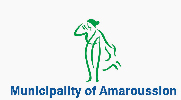
|
||
HIGHLIGHTS OF THE DAY 22 OCTOBER 2014 |
||
CONTENTS: |

|
|
|
The panel at the plenary session, Wednesday 22 October 2014 |
||
HEALTHY CITIES LESSONS LEARNED MAKING A DIFFERENCE
|
||
ROUND TABLE 1: EQUITY AND VULNERABILITY IN THE FACE OF AUSTERITYThis session explored the approaches and cities’ responses focused on groups facing vulnerability and issues of equity during times of austerity, through welfare state policies and with a focus on the local level. Also, key aspects of successful approaches were emphasized. The session drew on equity evaluation of the Healthy Cities network and findings from the European Review of Social Determinants and the Health Divide. An on-going study linking to work at the local level that has taken place in Sweden was presented by Professor Olle Lundberg. Experiences of equity and vulnerability in Greek in cities were shared by Professor Tountas. The Urban Health Equity Assessment and Response Tool was presented by Paul Rosenberg. Presentation was also delivered by Anna Ritsatakis. |
||
ROUND TABLE 2: SMOKE-FREE CITIES - FROM IDEA TO ACTIONThis session set the scene and provided the global and regional overview of smoke-free cities. The session also presented practical cases of smoke-free cities by answering to questions what, why and how and discussing dynamics at play. The discussion built on experiences and lessons learned of smoke-free cities, focused on what a city can do, and what could be key elements of success. Presentations were made by: Kristina Mauer-Stender, Jill Farrington, Ronald Gould, Maija Perho, Milka Donchin, and Eleni Antoniadou. |
||
ROUND TABLE 3: MIGRATION AND HEALTH: CHALLENGING ISSUES RELATING TO UNDOCUMENTED MIGRANTSThe scope of this session was: to describe public health issues related to migrants; to discuss about control of communicative diseases in this population; to describe the need for special health services for particularly vulnerable migrant groups; to describe financial issues and need for initiatives/funds supporting such work. Presentations were made by the following speakers experienced in handling migrant-related issues: Sotirios Tsiodras, Kostas Athanasakis, and Maria Tseroni. Session was chaired by Jenny Kremastinou, Professor and President, HCDCP, Athens, Greece. |
||
ROUND TABLE 4: EMERGING ISSUES IN URBAN ENVIRONMENT HEALTHEnvironmental health issues were presented by Maria Neira, Director, Public Health, Environmental and Social Determinants of Health, WHO; Graham Alabaster, Senior Adviser, United Nations Human Settlements Programme (UN-Habitat), and Jean Simos, Professor, University of Geneva, Switzerland. Session was chaired by Carlos Dora, Coordinator, Department of Public Health and Environment, WHO. |
||
GALA OPENING HIGHLIGHTSA concert by the Cultural Association of the city of Philothei-Psychiko and ‘Efterpi’ Choir opened and closed the Official Gala Opening at the Conference at Megaron Athens Concert Hall, a venue known for staging high-quality cultural and educational events. |
||
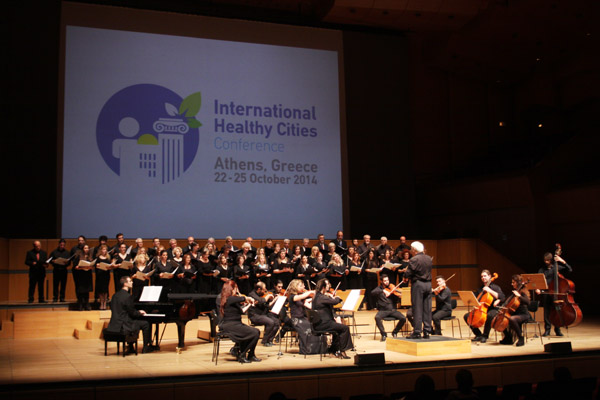
|
||
|
The ensemble and choir perform at Megaron Athens Concert Hall. |
||
WELCOMING ADDRESSESWelcome speeches were addressed by Georgios Patoulis, Mayor of Amaroussion, Olga Kefalogianni, Greek Minister of Tourism, and Dr. Agis D. Tsouros, WHO Regional Office for Europe. |
||
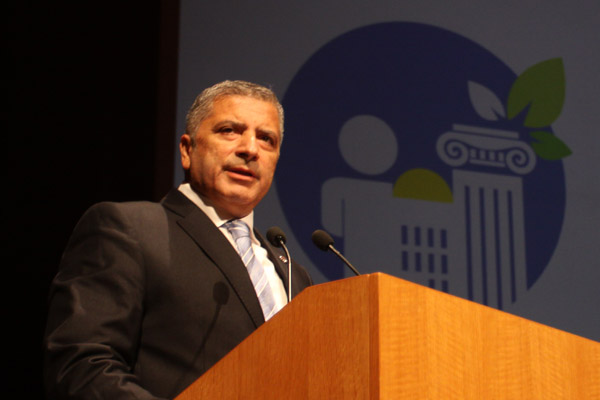
|
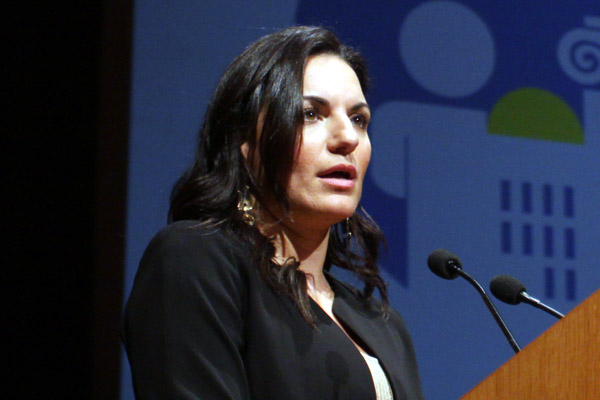
|
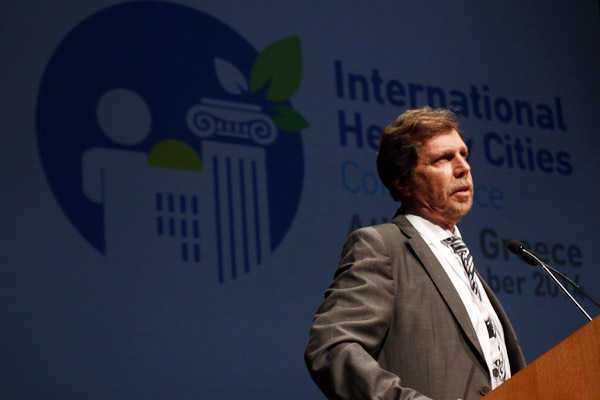
|
|
Dr Georgios Patoulis, |
Olga Kefalogianni, |
Agis D. Tsouros, |
WELCOME ADDRESSGeorgios Patoulis, welcomed the delegates and pointed out the importance of the International Healthy Cities Conference 2014, marking 25 years of the Healthy Cities movement. The Conference is hosted by the City of Amaroussion, one of 12 cities of the ancient State-city of Athens, an area inhabited for 3500 years. M. Patoulis concluded that during the conference “we shall envision and discuss about the future; where to go from here; how to make our cities better; how to ensure a better quality of life to the citizens.” |
MINISTER ADDRESSThe minister of Tourism, Olga Kefalogianni, welcomed all participants to Greece and in her short speech she gave her vision for healthy tourism. She referred to the special forms of tourism that are expected to give an extra boost to the country's growth. "Greece is not only sun and sea. It may be a holistic experience with the food, the landscape, the thermal springs... In all cases there has to be effective cooperation between the cities and the government, and we must take good care of our infrastructure to provide for the needs of all citizens," she said. |
HEALTHY CITIESAgis D. Tsouros in his welcome speech commented that Healthy Cities movement has proven to be sustainable over 25 years; this is due among others to the fact that it is relevant, i.e. it adapts to the realities of the city; it is strongly linked to specific commitments; it is connected with local initiatives strategies & other movements; and finally, it is based on understanding of political processes. In terms of the movement’s approach to vulnerable citizens, “when planning for our cities we have always to remember who is left outside,” Dr Tsouros said. |
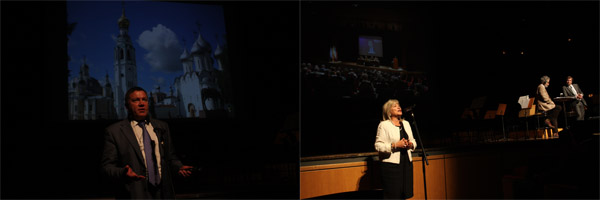
|
||
|
Healthy cities representatives share their experiences |
||
TESTIMONIALSA ceremony highlight comprised Agis D. Tsouros and Franklin Apfel’s original presentation of the 25 years of the Healthy Cities movement, introducing ‘testimonials’ of active members of the movement who shared their experience throughout the years. Healthy Cities networks members from Croatia, Northern Ireland, Greece, Austria, France, Portugal, Russia, Turkey and Norway commented on how the movement showed the way to substantial change to the cities through the holistic approach of the city. | ||
DO NOT MISS TODAY 23 OCTOBER 2014 |
||
|
Today's focus is on the power of local action with a special theme under the title |
||
1 |
2 |
3 |
|
The Plenary starts at 8:00 am presenting "The power of city diplomacy" and insights from the Russian Association of Healthy Cities and Rural Settlements. |
A Politicians' Panel, featuring Mayors and other officials will follow discussing visions and problem-solving in urban policy making and advocacy for health. |
The “Active Citizens” Greek track session will present citizens initiatives on culture, vulnerable social groups and voluntarism. |
|
|
||



